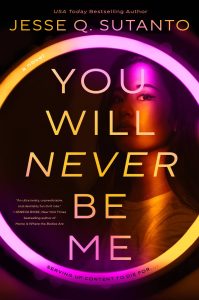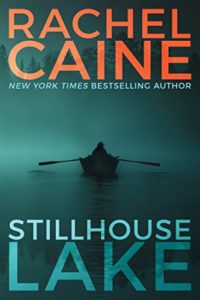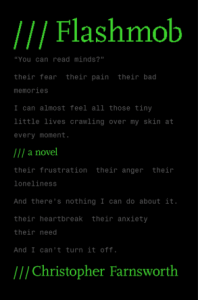★★★★★
Jesse Sutanto’s searing satirical crime novel is set in LA among the world of TikTok and Instagram influencers who are all desperate to be skinny, beautiful, and have millions of followers no matter what their online “niche” is. Not just any kind of skinny, mind you, but “LA skinny.”
Successful influencer and gifted schmoozer Meredith, whose super power is making people like her, was offering “beauty and fashion advice with sass” until her fan-protégée Aspen led her into “momfluencing.” That’s content aimed at mothers of all ages to show how their lives can be fabulous and efficient at the same time. It seems like a deliciously inventive, smooth road that all-too-soon turns rocky.
Aspen was struggling hard until she met Meredith in person. She’s got three kids, one of whom has diabetes; no insurance; and a resentful, low-earning husband. As she puts it, she feels “like I’m on a hamster wheel, needing to come up with nonstop content to feed the perpetually hungry social media machine. But my family, spoiled by my success, had no idea how I was breaking my back to earn as much as I could for their sake.”
Originally, Aspen only had a measly five thousand measly followers. Under Meredith’s canny guidance about “looks” and content, Aspen soon outpaces her mentor and her numbers blow up. But major success is a torment because it’s absolutely voracious–it makes her hungrier for more, more, more. She’s increasingly desperate to churn out video and photos of her home and family to show how perfect her life is.
And pretty soon, the All About Eve bell starts to ring as the two women’s friendship goes downhill–and takes a wonderfully bizarre and vicious detour halfway through the book.
Dealing with racism and greed in subtle ways, the novel is alternately hilarious and chilling, an indictment of social media fakery and emptiness. I read it straight through, laughing on many pages, appalled on others, and transfixed by the author’s keen eye for detail and paradox. She’s also given her dual narrators, Meredith and Aspen, pitch-perfect voices–and that extends to all of the minor characters too, including the kids.
Sutanto excels at hitting readers with the unexpected, and there are several jaw-dropping twists near the end along with what feels like a super-subtle reference to Sharon Stone’s Diabolique. And then there’s the ever-delightful satire of LA:
“LA is full of wannabes. It is weary of wannabes. Its skin has been hardened by cynicism (and Botox), and it has no time for wannabes.” And it’s “the land of over-the-top emotions. When it comes to emoting here, you’ve got to go big and fake, or go home.”
I don’t dog-ear books, but I did find myself putting Post-its on page after page and even reading memorable passages to my spouse, like one about a picture-perfect dinner Asp[en cooks that is a total, tasteless sham.
You Will Never Be Me can be seen as a beach read, but that doesn’t do it justice. Sutanto’s thrilling, electrifying novel is an evisceration of how social media oppresses and intimidates far too many people and can ruin their lives when it’s ostensibly doing the very opposite. It’s also a fast-paced and thrilling story of narcissistic friendship and betrayal.
I bloody love this book.
Lev Raphael is the former crime fiction reviewer for The Detroit Free Press and has reviewed for The Washington Post as well as several Michigan radio stations, one of which aired his interview show. His guests there included Doris Kearns Goodwin, Salman Rushdie, Julian Barnes, and Erica Jong.







